-
IP addresses are NOT logged in this forum so there's no point asking. Please note that this forum is full of homophobes, racists, lunatics, schizophrenics & absolute nut jobs with a smattering of geniuses, Chinese chauvinists, Moderate Muslims and last but not least a couple of "know-it-alls" constantly sprouting their dubious wisdom. If you believe that content generated by unsavory characters might cause you offense PLEASE LEAVE NOW! Sammyboy Admin and Staff are not responsible for your hurt feelings should you choose to read any of the content here. The OTHER forum is HERE so please stop asking.
You are using an out of date browser. It may not display this or other websites correctly.
You should upgrade or use an alternative browser.
You should upgrade or use an alternative browser.
#OccupyCentral thread: Give me Liberty or Give me Death!
- Thread starter Asterix
- Start date
- Joined
- Sep 4, 2010
- Messages
- 515
- Points
- 0
Re: HK Protest Leaders High! Demands Talks With 11 Jinping In Peking!
Hong Kong people have more balls than you sinkie losers.
Hong Kong people have more balls than you sinkie losers.
- Joined
- Sep 4, 2010
- Messages
- 515
- Points
- 0
Re: HK Protest Leaders High! Demands Talks With 11 Jinping In Peking!
You are correct, Ang Moh is No 1. Sinkies are last.
Just because the Chinks in Chingyland don't do it, doesn't mean the Hongkies can't do so. Hongkies are the 2nd Best! Ang Moh is the No.1 Best!
You are correct, Ang Moh is No 1. Sinkies are last.
- Joined
- Oct 12, 2011
- Messages
- 321
- Points
- 18
Re: HK Protest Leaders High! Demands Talks With 11 Jinping In Peking!
Should not be fucking entertained at all, shoot them!
They are nobody to see the boss. If they got entertained they start to think fucking big. All the peasants in thousands of PRC cities will expect to riot and demand all sorts of rubbish.
Western Democracy is RUBBISH and POISON, just the correct way to show how to deal with it is to CRUSH with BLOOD.
NO TALK AT ALL. If Govt adopted the wrong move the mistake will be spread to all cities uncontrollable forever.
There should be no HUMAN RIGHTS nor FREEDOM nor DEMOCRACY anywhere, not at all.
Just crushed like an ant. Not one at a time, 1st time 10, 2nd time 50, 3rd time 500, 4th time 10000. The price is affordable because HK is 6 million population only and PRC is billion and half. You won't let 6 million rubbish affect and spoil 1.5 billion. If needed kill 6 million in all, don't feel fucking sorry.
Should not be fucking entertained at all, shoot them!
They are nobody to see the boss. If they got entertained they start to think fucking big. All the peasants in thousands of PRC cities will expect to riot and demand all sorts of rubbish.
Western Democracy is RUBBISH and POISON, just the correct way to show how to deal with it is to CRUSH with BLOOD.
NO TALK AT ALL. If Govt adopted the wrong move the mistake will be spread to all cities uncontrollable forever.
There should be no HUMAN RIGHTS nor FREEDOM nor DEMOCRACY anywhere, not at all.
Just crushed like an ant. Not one at a time, 1st time 10, 2nd time 50, 3rd time 500, 4th time 10000. The price is affordable because HK is 6 million population only and PRC is billion and half. You won't let 6 million rubbish affect and spoil 1.5 billion. If needed kill 6 million in all, don't feel fucking sorry.
http://www.straitstimes.com/news/as...aders-request-formal-meeting-beijing-20141107
This is evidence that the protests leaders are high. Police ought to search their protest sites for illegal drugs. They actually demand to talk to Peking leaders directly. Even normal China peasants don't get to see the top CCP leaders. Why HK so special?
Send in the tanks!
Last edited:
- Joined
- Oct 12, 2011
- Messages
- 321
- Points
- 18
Re: HK Protest Leaders High! Demands Talks With 11 Jinping In Peking!
吃西洋大粪的傻屄民主混球。自以为是啥东西?
霸占街道造反没有被打死了就以为自己有条件提要求见领导?
北京太客气了。就是应该心狠手辣,血淋淋的血肉模糊的砸死死一千几百个。示范一下给西方野狗见识见识增广见闻。千万不要以为会给它们留啥面子。以后就是可以肯定这种
标准格式处理。没有任何例外的。
西方民主?我戳你个妈!
香港人自己一直退步。没有任何优良贡献。没有立功劳。没有啥本事。回归以来就一直依赖大陆养活着。愈来愈退步。价值根本不值得一提。有啥资格有啥脸皮要求特别多政治优惠?
大陆无数城市乡镇表现优异贡献牺牲立功。刻苦耐劳。任劳任怨。也没有什么政治要求。条件人口经济力量都强过香港很多倍。北京如果不重手杀戮给它血淋淋的杀戮教学一次。其他城市的吃西洋大粪傻屄也会大起狗胆学样造反。台独的狗胆也大起来。
西洋东洋的野狗国家们都以为自己很他妈的有面子。有本钱有影响力。可以包庇吃西洋大粪的傻屄在中国造反?我认为就是要特别杀戮他们的洋人。给它尝尝血腥教训的味道。自己去搞清楚自己是啥野狗东西。不知死活的东西!
吃西洋大粪的傻屄民主混球。自以为是啥东西?
霸占街道造反没有被打死了就以为自己有条件提要求见领导?
北京太客气了。就是应该心狠手辣,血淋淋的血肉模糊的砸死死一千几百个。示范一下给西方野狗见识见识增广见闻。千万不要以为会给它们留啥面子。以后就是可以肯定这种
标准格式处理。没有任何例外的。
西方民主?我戳你个妈!
香港人自己一直退步。没有任何优良贡献。没有立功劳。没有啥本事。回归以来就一直依赖大陆养活着。愈来愈退步。价值根本不值得一提。有啥资格有啥脸皮要求特别多政治优惠?
大陆无数城市乡镇表现优异贡献牺牲立功。刻苦耐劳。任劳任怨。也没有什么政治要求。条件人口经济力量都强过香港很多倍。北京如果不重手杀戮给它血淋淋的杀戮教学一次。其他城市的吃西洋大粪傻屄也会大起狗胆学样造反。台独的狗胆也大起来。
西洋东洋的野狗国家们都以为自己很他妈的有面子。有本钱有影响力。可以包庇吃西洋大粪的傻屄在中国造反?我认为就是要特别杀戮他们的洋人。给它尝尝血腥教训的味道。自己去搞清楚自己是啥野狗东西。不知死活的东西!
Re: Give me Liberty or Give me Death! Giordano Tycoon joins Occupy Central!
Police will back bailiffs to enforce injunctions to end Occupy sit-ins
Decision Monday on injunctions that call for Mong Kok and Admiralty sites to be cleared
PUBLISHED : Saturday, 08 November, 2014, 4:04am
UPDATED : Saturday, 08 November, 2014, 4:04am
Thomas Chan, Clifford Lo, Tony Cheung and Timmy Sung
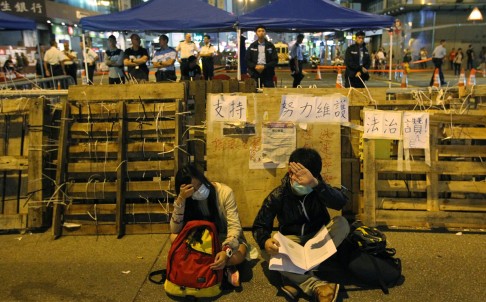
A High Court judge will rule on Monday on applications for injunctions to clear barricades at Occupy protest sites in Mong Kok and Admiralty. Photo: Edward Wong
A High Court judge will rule on Monday on applications for injunctions to clear barricades at Occupy protest sites in Mong Kok and Admiralty.
If the Court of First Instance rules in favour of the applicants, bailiffs will be sent to carry out the court orders.
Legal experts suggest that police could step in if public peace was broken or disturbed, while a police source confirmed that officers would help bailiffs execute the orders if the court gives such a direction.
Chiu Luen Public Light Bus Company, the Taxi Association and the Taxi Drivers and Operators Association are asking for parts of Nathan Road, Mong Kok, to be cleared, while Goldon Investment, owner of Citic Tower in Admiralty, is seeking the removal of barricades blocking the building's entrances and exits.
Dennis Kwok, a barrister and the legal sector lawmaker, said: "Bailiffs could report to the judge if they have difficulties in executing the orders and seek court directions."
He said police could make arrests if there was a breach of the peace when bailiffs carried out their duties.
Eric Cheung Tat-ming, principal law lecturer at the University of Hong Kong, said it was an offence for anyone to obstruct police officers in the execution of their duty.
The police source said: "We will discuss with bailiffs and issue enough warnings to illegal occupiers before going together with bailiffs to execute the orders and tear down barricades."
He stressed that those who refused to leave or obstructed officers in the execution of their duty would face arrest.
The barricades in Mong Kok were likely to be the first to be removed, the source said, and at least 1,000 officers would be deployed there for the purpose.
In Admiralty, 22-year-old protester Sing Yu, who has been camping outside Citic Tower for two weeks, said: "If the injunction requires us to remove our barricades on Lung Wui Road and the tents outside the building, personally, I would accept the decision."
In Mong Kok, Enzo Tang said he would not obstructing "real bailiffs" from carrying out their duties.
Another protester said whether he would resist bailiffs or police would depend on the response of fellow protesters.
Separately, the court will hear injunction applications filed by Kwoon Chung Bus and its subsidiaries on Tuesday.
According to court documents, about one-fifth of the roads occupied by pro-democracy protesters in Admiralty would be reopened if the injunctions sought by bus operators are granted.
Police will back bailiffs to enforce injunctions to end Occupy sit-ins
Decision Monday on injunctions that call for Mong Kok and Admiralty sites to be cleared
PUBLISHED : Saturday, 08 November, 2014, 4:04am
UPDATED : Saturday, 08 November, 2014, 4:04am
Thomas Chan, Clifford Lo, Tony Cheung and Timmy Sung

A High Court judge will rule on Monday on applications for injunctions to clear barricades at Occupy protest sites in Mong Kok and Admiralty. Photo: Edward Wong
A High Court judge will rule on Monday on applications for injunctions to clear barricades at Occupy protest sites in Mong Kok and Admiralty.
If the Court of First Instance rules in favour of the applicants, bailiffs will be sent to carry out the court orders.
Legal experts suggest that police could step in if public peace was broken or disturbed, while a police source confirmed that officers would help bailiffs execute the orders if the court gives such a direction.
Chiu Luen Public Light Bus Company, the Taxi Association and the Taxi Drivers and Operators Association are asking for parts of Nathan Road, Mong Kok, to be cleared, while Goldon Investment, owner of Citic Tower in Admiralty, is seeking the removal of barricades blocking the building's entrances and exits.
Dennis Kwok, a barrister and the legal sector lawmaker, said: "Bailiffs could report to the judge if they have difficulties in executing the orders and seek court directions."
He said police could make arrests if there was a breach of the peace when bailiffs carried out their duties.
Eric Cheung Tat-ming, principal law lecturer at the University of Hong Kong, said it was an offence for anyone to obstruct police officers in the execution of their duty.
The police source said: "We will discuss with bailiffs and issue enough warnings to illegal occupiers before going together with bailiffs to execute the orders and tear down barricades."
He stressed that those who refused to leave or obstructed officers in the execution of their duty would face arrest.
The barricades in Mong Kok were likely to be the first to be removed, the source said, and at least 1,000 officers would be deployed there for the purpose.
In Admiralty, 22-year-old protester Sing Yu, who has been camping outside Citic Tower for two weeks, said: "If the injunction requires us to remove our barricades on Lung Wui Road and the tents outside the building, personally, I would accept the decision."
In Mong Kok, Enzo Tang said he would not obstructing "real bailiffs" from carrying out their duties.
Another protester said whether he would resist bailiffs or police would depend on the response of fellow protesters.
Separately, the court will hear injunction applications filed by Kwoon Chung Bus and its subsidiaries on Tuesday.
According to court documents, about one-fifth of the roads occupied by pro-democracy protesters in Admiralty would be reopened if the injunctions sought by bus operators are granted.
PUBLISHED : Saturday, 08 November, 2014, 5:27am
UPDATED : Saturday, 08 November, 2014, 5:27am
Former Canto-pop star sings old tune on Hong Kong police and Occupy Central
Alex Lo [email protected]
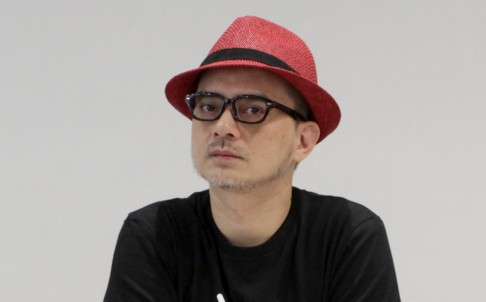
Anthony Wong said that the fine reputation of the police had been undone on September 28 by the firing of tear gas.
One-time Canto-pop star Anthony Wong Yiu-ming has a knack for jumping on the bandwagon. He started campaigning for gay rights when it became safe and even fashionable to do so. Now when young people are rounding on the police for their alleged brutality, he has formed a group called Hong Kong Shield to join the chorus.
In a letter to the Post this week, he just about repeated every allegation, slander and rumour ever levelled against the police. When the likes of Wong and Jimmy Lai Chee-ying's Apple Daily repeat and recycle the same lies and exaggerations often enough, somehow they become facts in the uncritical minds of many people.
Wong said that the fine reputation of the police had been undone on September 28 by the firing of tear gas; they had colluded with or at least condoned triad and anti-Occupy Central efforts to stir up trouble within the Occupy movement; they had repeatedly used excessive force against peaceful protesters; and their use of tear gas, pepper spray and batons was unjustified, possibly illegal and against international standards.
I agree the use of tear gas has been a public relations disaster for the police. But that's mostly because Hong Kong has been a peaceful place so the use of tear gas was rare and shocking. It is, however, regularly used overseas, including in mature democracies to avoid the use of deadly force. Moreover, after much criticism, the city's police have effectively banned its use. There are few police forces in the world that would self-impose such a moratorium.
Frontline officers have been remarkably restrained, sometimes unjustifiably so, towards everyone - Occupy and anti-Occupy protesters and troublemakers such as suspected triads.
The fault lies primarily with the government, whose "no compromise and no violence" policy effectively forces the police to stand guard like babysitters.
Student protesters expect police to take no action against them, and only against those who criticise or provoke them. If Wong wants our police to follow what he inexplicably calls "international standards", they would have used all available non-lethal means to clear the streets by now, leading to cases of cracked skulls and broken bones.
Re: Give me Liberty or Give me Death! Giordano Tycoon joins Occupy Central!
Desperately seeking new ideas to break Occupy impasse
PUBLISHED : Saturday, 08 November, 2014, 5:27am
UPDATED : Saturday, 08 November, 2014, 5:27am
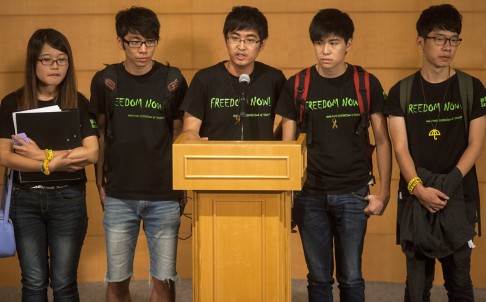
Student leaders speak at a press briefing after a meeting with government officials to attempt to resolve the pro-democracy road occupations and resulting political crisis. Photo: EPA
After six weeks on the streets and one round of unproductive talks, all we have is an impasse between the Occupy movement and the government.
There are not even proposals for a second round of talks. Both sides seem to be completely bereft of new ideas to resolve the situation.
What is the point in the Occupy movement's plan of going to Beijing or asking for talks with Li Keqiang if the protesters have nothing to say except to ask for withdrawal of the August 31 decision?
Does the government want the occupiers to just roll up their tents and go home with no clarity on their main demands? The administration has to understand that governing goes beyond sending in the police and includes convincing the citizens.
Rather than ask for a withdrawal of the August 31 decision, both sides (and the central government) should be exploring points where mutually acceptable changes can be made to the decision.
For example:
1. What can be done to change the 1,200-person committee to make it more acceptable? Can it be expanded to, say, 2,000 with a greater share of directly elected representatives? Can its composition be changed?
2. Can the minimum requirement of 50 per cent of 1,200 votes be lowered, say to 12.5 per cent or even 25 per cent? That would let people with different viewpoints enter the election, particularly if the ceiling of three candidates is waived.
3. Can the field of three candidates be expanded to, say, 10? This change is not so meaningful if each candidate has to get 50 per cent of 1,200 votes, but it would at least generate more competition of ideas.
4. Can there be a time-bound road map to real free elections in 2022, combined with one of the above alternatives for 2017? That may make the 2017 compromises more acceptable to both sides.
5. The government has proposed a multiparty consultation system. Can that system be adopted?
Some of these solutions can be discussed within the framework of the August 31 decision, and that may be the winning card in this situation.
If there are indeed some backdoor negotiations going on in search of solutions, it is good to say so.
The image in the minds of the Hong Kong people and international watchers is that there is a standstill with no ideas from either side.
Dilip Parameswaran, Pok Fu Lam
Desperately seeking new ideas to break Occupy impasse
PUBLISHED : Saturday, 08 November, 2014, 5:27am
UPDATED : Saturday, 08 November, 2014, 5:27am

Student leaders speak at a press briefing after a meeting with government officials to attempt to resolve the pro-democracy road occupations and resulting political crisis. Photo: EPA
After six weeks on the streets and one round of unproductive talks, all we have is an impasse between the Occupy movement and the government.
There are not even proposals for a second round of talks. Both sides seem to be completely bereft of new ideas to resolve the situation.
What is the point in the Occupy movement's plan of going to Beijing or asking for talks with Li Keqiang if the protesters have nothing to say except to ask for withdrawal of the August 31 decision?
Does the government want the occupiers to just roll up their tents and go home with no clarity on their main demands? The administration has to understand that governing goes beyond sending in the police and includes convincing the citizens.
Rather than ask for a withdrawal of the August 31 decision, both sides (and the central government) should be exploring points where mutually acceptable changes can be made to the decision.
For example:
1. What can be done to change the 1,200-person committee to make it more acceptable? Can it be expanded to, say, 2,000 with a greater share of directly elected representatives? Can its composition be changed?
2. Can the minimum requirement of 50 per cent of 1,200 votes be lowered, say to 12.5 per cent or even 25 per cent? That would let people with different viewpoints enter the election, particularly if the ceiling of three candidates is waived.
3. Can the field of three candidates be expanded to, say, 10? This change is not so meaningful if each candidate has to get 50 per cent of 1,200 votes, but it would at least generate more competition of ideas.
4. Can there be a time-bound road map to real free elections in 2022, combined with one of the above alternatives for 2017? That may make the 2017 compromises more acceptable to both sides.
5. The government has proposed a multiparty consultation system. Can that system be adopted?
Some of these solutions can be discussed within the framework of the August 31 decision, and that may be the winning card in this situation.
If there are indeed some backdoor negotiations going on in search of solutions, it is good to say so.
The image in the minds of the Hong Kong people and international watchers is that there is a standstill with no ideas from either side.
Dilip Parameswaran, Pok Fu Lam
Re: HK Govt. host televised talk with citizens rep. PAP balless with Roy & HHH
Japanese novelist Haruki Murakami sends message backing Hong Kong protesters
PUBLISHED : Saturday, 08 November, 2014, 9:11am
UPDATED : Saturday, 08 November, 2014, 11:43am
Kyodo in Berlin
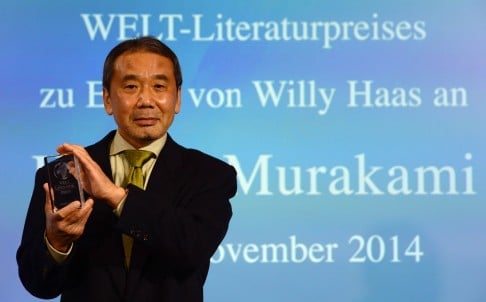
Haruki Murakami poses with his trophy for Germany's Welt Literature Prize in Berlin on Friday. Photo: AFP
Japanese novelist Haruki Murakami sent a message of encouragement to Hong Kong’s pro-democracy protesters in Berlin on Friday, drawing parallels between their situation and that of people confined by the Berlin Wall and ongoing conflict in Gaza.
Murakami is the first Japanese author awarded the Welt Literature Prize by German daily newspaper Die Welt since the 10,000-euro prize was established in 1999.
Accepting the prize, he spoke of his own memories of the Berlin Wall prior to its fall 25 years ago, and attributed ongoing conflicts throughout the world to a system of walls that drive people apart based on intolerance, greed and fear.
Murakami said it is the task of novelists to help readers pass through these walls, and that harnessing the power of each person’s imagination “could be the starting point of something.”
A world without walls can be created “in the quiet but sustained effort to keep on singing, to keep on telling stories, stories about a better and freer world to come, without losing heart,” he said.
“We can see [a world without walls] with our own eyes – we can even touch it with our own hands if we try hard.
“I’d like to send this message to the young people in Hong Kong who are struggling against their wall right now at this moment.”
Student-led blockades of major thoroughfares in Hong Kong have continued since September 28 in response to the August 31 decision by Beijing authorities to restrict candidates for the 2017 chief executive election to those vetted by a committee.
In February 2009, Murakami accepted the Jerusalem Prize despite calls to boycott it in the wake of Israel’s large-scale offensive in Gaza. Speaking in Jerusalem, he compared walls to authoritarian systems and military might and eggs thrown against the walls to individual lives, concluding that he “will always stand on the side of the egg.”
Murakami has had his stories translated into many languages, and has often been mentioned as a potential recipient of the Nobel Prize in Literature.
The English edition of his latest novel, Colourless Tsukuru Tazaki and His Years of Pilgrimage, topped the New York Times’ best-seller list in its category following its release in August.
Japanese novelist Haruki Murakami sends message backing Hong Kong protesters
PUBLISHED : Saturday, 08 November, 2014, 9:11am
UPDATED : Saturday, 08 November, 2014, 11:43am
Kyodo in Berlin

Haruki Murakami poses with his trophy for Germany's Welt Literature Prize in Berlin on Friday. Photo: AFP
Japanese novelist Haruki Murakami sent a message of encouragement to Hong Kong’s pro-democracy protesters in Berlin on Friday, drawing parallels between their situation and that of people confined by the Berlin Wall and ongoing conflict in Gaza.
Murakami is the first Japanese author awarded the Welt Literature Prize by German daily newspaper Die Welt since the 10,000-euro prize was established in 1999.
Accepting the prize, he spoke of his own memories of the Berlin Wall prior to its fall 25 years ago, and attributed ongoing conflicts throughout the world to a system of walls that drive people apart based on intolerance, greed and fear.
Murakami said it is the task of novelists to help readers pass through these walls, and that harnessing the power of each person’s imagination “could be the starting point of something.”
A world without walls can be created “in the quiet but sustained effort to keep on singing, to keep on telling stories, stories about a better and freer world to come, without losing heart,” he said.
“We can see [a world without walls] with our own eyes – we can even touch it with our own hands if we try hard.
“I’d like to send this message to the young people in Hong Kong who are struggling against their wall right now at this moment.”
Student-led blockades of major thoroughfares in Hong Kong have continued since September 28 in response to the August 31 decision by Beijing authorities to restrict candidates for the 2017 chief executive election to those vetted by a committee.
In February 2009, Murakami accepted the Jerusalem Prize despite calls to boycott it in the wake of Israel’s large-scale offensive in Gaza. Speaking in Jerusalem, he compared walls to authoritarian systems and military might and eggs thrown against the walls to individual lives, concluding that he “will always stand on the side of the egg.”
Murakami has had his stories translated into many languages, and has often been mentioned as a potential recipient of the Nobel Prize in Literature.
The English edition of his latest novel, Colourless Tsukuru Tazaki and His Years of Pilgrimage, topped the New York Times’ best-seller list in its category following its release in August.
- Joined
- Dec 11, 2012
- Messages
- 9,068
- Points
- 63
Re: HK Protest Leaders High! Demands Talks With 11 Jinping In Peking!
The best and everlasting political system is the Kingdom of God on Earth, which is supposed to rule for a 1,000 years, but then the politician who is supposed to usher in such a beautiful political system was murdered on the cross more than 2,000 years ago.
The alternative political system now is for the world to be ruled by cyborgs, which is human's last stance on Earth. Then they will learn.
Meanwhile, keep inhaling that whitish powder and seek ultimate orgasms in that futuristic virtual sex machine.
The best and everlasting political system is the Kingdom of God on Earth, which is supposed to rule for a 1,000 years, but then the politician who is supposed to usher in such a beautiful political system was murdered on the cross more than 2,000 years ago.
The alternative political system now is for the world to be ruled by cyborgs, which is human's last stance on Earth. Then they will learn.
Meanwhile, keep inhaling that whitish powder and seek ultimate orgasms in that futuristic virtual sex machine.
- Joined
- Jul 10, 2008
- Messages
- 24,581
- Points
- 0
Re: HK Protest Leaders High! Demands Talks With 11 Jinping In Peking!
That is because they got balls. Unlike sinkie losers.
http://www.straitstimes.com/news/as...aders-request-formal-meeting-beijing-20141107
This is evidence that the protests leaders are high. Police ought to search their protest sites for illegal drugs. They actually demand to talk to Peking leaders directly. Even normal China peasants don't get to see the top CCP leaders. Why HK so special?
Send in the tanks!
That is because they got balls. Unlike sinkie losers.
- Joined
- Jul 17, 2008
- Messages
- 13,369
- Points
- 83
Re: HK Protest Leaders High! Demands Talks With 11 Jinping In Peking!
What?? Your offer your mother's old cunt to UNMO? Good for her!
That is because they got balls. Unlike sinkie losers.
What?? Your offer your mother's old cunt to UNMO? Good for her!
- Joined
- Nov 8, 2014
- Messages
- 226
- Points
- 0
Re: HK Protest Leaders High! Demands Talks With 11 Jinping In Peking!
Will the two of u stop bickering and spread love and homosexuality instead?
That is because they got balls. Unlike sinkie losers.
What?? Your offer your mother's old cunt to UNMO? Good for her!
Will the two of u stop bickering and spread love and homosexuality instead?
Re: HK Protest Leaders High! Demands Talks With 11 Jinping In Peking!
By the way have u stop poking other peoples mum?
By the way have u stop poking other peoples mum?
Gay pride parade and Occupy movement promote equal rights in society
PUBLISHED : Saturday, 08 November, 2014, 8:13pm
UPDATED : Sunday, 09 November, 2014, 4:50am
Fanny W.Y. Fung [email protected]
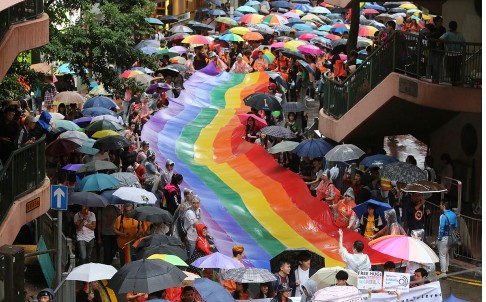
Participants carry a rainbow flag in Causeway Bay as part of the gay pride parade. Photo: Sam Tsang
Hong Kong's colourful annual gay pride parade took on an overtly political tinge yesterday as Occupy moved in, boosting numbers and adding umbrellas as well as a dose of controversy.
Thousands marched through the rain from Victoria Park to Tamar Park to demand legislation outlawing discrimination on the grounds of sexual orientation. While organisers had ordered 500 rainbow umbrellas before they became a protest symbol, many more were on show, perhaps due to the Occupy factor or maybe because of the rain.
Federation of Students leaders Alex Chow Yong-kang and Lester Shum, two key figures in the Occupy protests, took part and backed the call for equal rights for gays. "Regardless of whether you are gay, bisexual or transgender, we all have the moral responsibility to speak out. Stand up to change the world. Confront unreasonable pride, prejudice, cruelty and indifference," Chow, the federation's secretary general, told the crowd. Organisers said 8,900 took part, up from their estimate of 5,200 last year. Police said 4,700 people attended at the peak of the march, compared with 4,500 last year.
Parade spokeswoman Alice Wei Siu-lik said "umbrella movement" students had boosted the turnout. Three hundred people had signed up as volunteers for the rally, about half of whom were students, she said. More corporate sponsorship was another factor helping with publicity, she said, and the MTR Corp had allowed organisers to display adverts at all stations at a discount rate for a month.
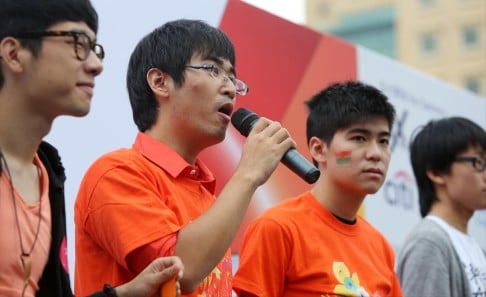
The Federation of Students' Nathan Law, Alex Chow and Lester Shum attend the parade. Photo: Sam Tsang
The move to link the democracy and gay-rights movements was not universally welcomed.
"It is inappropriate to bundle a gay movement with a movement for democracy and freedom," the Family School Sexual Orientation Discrimination Ordinance Concern Group - an anti-gay-rights group headed by Roger Wong Wai-ming, the father of Scholarism convenor Joshua Wong Chi-fung - said. "In our understanding, the so-called demands made in the 'equal rights movement for the gay' are contravening human rights and justice."
When asked to respond to his father's remarks, Joshua Wong said he was "too busy" to comment.
A spokesman for the Constitutional and Mainland Affairs Bureau said society was "still deeply divided as to whether legislation should be enacted to prohibit discrimination on grounds of sexual orientation or gender identity. Some are in support from the perspective of equal opportunity, while others are concerned that this may deal a blow to family, religion and education. This is a highly controversial and sensitive issue in Hong Kong which must be tackled cautiously."
Commission chairman Dr York Chow Yat-ngok joined the parade for the second time, despite criticism from anti-gay groups last year.
Re: UN supports HK protestors!!!
'There is no point in talks with Beijing', ex-Hong Kong chief executive Tung Chee-hwa tells students
Former chief executive sidesteps request by students that he help arrange meeting with state leaders, saying their stance won't change
PUBLISHED : Sunday, 09 November, 2014, 6:10am
UPDATED : Sunday, 09 November, 2014, 11:30am
Joyce Ng and Vivienne Chow
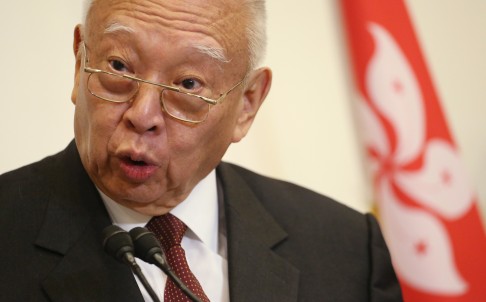
Former chief executive Tung Chee-hwa says Beijing will not change the political reform framework for Hong Kong. Photo: Felix Wong
Former chief executive Tung Chee-hwa has sidestepped a request by student organisers of the Occupy movement to meet state leaders, saying Beijing will not change the political reform framework for Hong Kong.
Tung's response came a day after a member of student activist group Scholarism on a personal trip to Shenzhen was denied entry to the mainland because he had taken part in activities that "violate national security".
Tung, a vice-chairman of the Chinese People's Political Consultative Conference, had read an open letter delivered to him by the Federation of Students on Friday, asking him to arrange the meeting, his spokesman said.
"[Tung] thinks they are just repeating their views and stance in the letter, which won't help to break the impasse," the spokesman said. "Mr Tung points out that the central government understands the different views in Hong Kong. The decision of the National People's Congress Standing Committee on August 31 will not change."
Chief Executive Leung Chun-ying said Beijing officials had met pan-democratic lawmakers several times, and the students' demand for public nomination of candidates for 2017 had already been put across. Leung emphasised his own role in setting up a Shanghai trip for lawmakers to meet the officials in April.
The August decision laid down the framework for the city to elect its leader by "one person, one vote" for the first time in 2017. An election committee will have exclusive power to nominate candidates for the race.
Tung urged students to end the protests and go back to their studies.
In a statement, the Federation said Tung had not said yes or no to their request, and it urged him to give a clear answer. It added: "Simply asking people to retreat from protest sites will not solve the political dispute."
The student who was stopped at the border on Friday was under 18 and was not a core member of Scholarism, its convenor, Joshua Wong Chi-fung, said on a radio show yesterday.
He said the group's website had been targeted in cyberattacks and wondered if mainland authorities had a blacklist of Scholarism members.
Wong said the student had gone to Shenzhen on a personal trip with his family, but when he got to the mainland side of the border, he was taken to a room and questioned. The teenager was later released.
In an editorial yesterday, The Washington Post said although it was unlikely that the students would be allowed near Beijing, President Barack Obama "ought to take a cue" and "he can make clear that the United States supports their call for genuinely free elections".
Meanwhile, the Civil Human Rights Front's appeal against a police decision not to open a driveway outside the central government's liaison office in Sheung Wan for protesters to assemble was dismissed.
The front planned to lead a pro-democracy march to the office today. The Appeal Board on Public Meetings and Processions said if the police were unable to control the marchers it could affect liaison office operations.
'There is no point in talks with Beijing', ex-Hong Kong chief executive Tung Chee-hwa tells students
Former chief executive sidesteps request by students that he help arrange meeting with state leaders, saying their stance won't change
PUBLISHED : Sunday, 09 November, 2014, 6:10am
UPDATED : Sunday, 09 November, 2014, 11:30am
Joyce Ng and Vivienne Chow

Former chief executive Tung Chee-hwa says Beijing will not change the political reform framework for Hong Kong. Photo: Felix Wong
Former chief executive Tung Chee-hwa has sidestepped a request by student organisers of the Occupy movement to meet state leaders, saying Beijing will not change the political reform framework for Hong Kong.
Tung's response came a day after a member of student activist group Scholarism on a personal trip to Shenzhen was denied entry to the mainland because he had taken part in activities that "violate national security".
Tung, a vice-chairman of the Chinese People's Political Consultative Conference, had read an open letter delivered to him by the Federation of Students on Friday, asking him to arrange the meeting, his spokesman said.
"[Tung] thinks they are just repeating their views and stance in the letter, which won't help to break the impasse," the spokesman said. "Mr Tung points out that the central government understands the different views in Hong Kong. The decision of the National People's Congress Standing Committee on August 31 will not change."
Chief Executive Leung Chun-ying said Beijing officials had met pan-democratic lawmakers several times, and the students' demand for public nomination of candidates for 2017 had already been put across. Leung emphasised his own role in setting up a Shanghai trip for lawmakers to meet the officials in April.
The August decision laid down the framework for the city to elect its leader by "one person, one vote" for the first time in 2017. An election committee will have exclusive power to nominate candidates for the race.
Tung urged students to end the protests and go back to their studies.
In a statement, the Federation said Tung had not said yes or no to their request, and it urged him to give a clear answer. It added: "Simply asking people to retreat from protest sites will not solve the political dispute."
The student who was stopped at the border on Friday was under 18 and was not a core member of Scholarism, its convenor, Joshua Wong Chi-fung, said on a radio show yesterday.
He said the group's website had been targeted in cyberattacks and wondered if mainland authorities had a blacklist of Scholarism members.
Wong said the student had gone to Shenzhen on a personal trip with his family, but when he got to the mainland side of the border, he was taken to a room and questioned. The teenager was later released.
In an editorial yesterday, The Washington Post said although it was unlikely that the students would be allowed near Beijing, President Barack Obama "ought to take a cue" and "he can make clear that the United States supports their call for genuinely free elections".
Meanwhile, the Civil Human Rights Front's appeal against a police decision not to open a driveway outside the central government's liaison office in Sheung Wan for protesters to assemble was dismissed.
The front planned to lead a pro-democracy march to the office today. The Appeal Board on Public Meetings and Processions said if the police were unable to control the marchers it could affect liaison office operations.
Re: UN supports HK protestors!!!
Is self-rule the real aim of Occupy protesters?
Regina Ip says by rejecting the Basic Law, protesters and their supporters are in effect demanding a quasi-independent status for Hong Kong that would cut out Beijing in the election process
PUBLISHED : Sunday, 09 November, 2014, 5:17am
UPDATED : Sunday, 09 November, 2014, 5:17am
Regina Ip
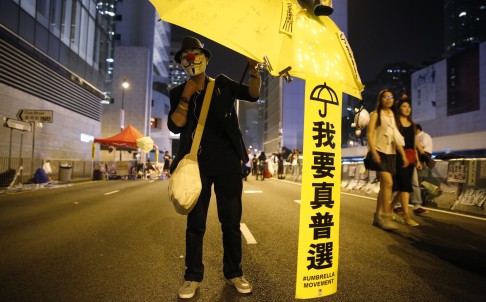
Why do the students and their supporters keep pressing for something that is neither internationally accepted nor consistent with the Basic Law? Photo: AP
For those who are determined that Hong Kong can never become democratic because its motherland is ruled by a communist party, which, by definition, is "a dictatorship of the proletariat", no attempt at democratisation would be meaningful, short of weaning Hong Kong from its motherland.
Student leaders of the Occupy protest, now into the sixth week, and those behind them appear to harbour similar thoughts. Despite declining public support for the protest, student leaders continue to insist on overturning Beijing's decision on the nominating mechanism for the 2017 election and replacing it with "civic nomination", so Hong Kong people can have an unfettered say on who would be their chief executive. To achieve their goal, the latest gimmick is a demand to meet the president in Beijing.
"Civic nomination" is far from being the international norm. Only six countries ranked by the Economist Intelligence Unit as "fully democratic" have "civic nomination" as one way of nominating candidates for high political office. Universal suffrage is, by definition, a universal and equal right to vote in genuine periodic elections by secret ballot. Our system of elections to district councils and the Legislative Council are entirely consistent with international norms.
The International Covenant on Civil and Political Rights forbids "unreasonable restrictions" on the exercise of political rights, but it is hard to equate these safeguards as mandating a universal right to nominate or to participate as a candidate.
So why do the students and their supporters keep pressing for something neither internationally accepted nor consistent with the Basic Law? Are they truly seeking democracy or a quasi-independent status that cuts Beijing out of the selection of the chief executive? Despite the Western media's initial branding of the protest as an "umbrella revolution", local advocates have taken care to drop the "R" word. But in their hearts, hiding behind banners broadcasting the "D" word from the Lion Rock, are they actually seeking self-rule? Failing that, as much damage to the Leung Chun-ying administration and relationship between Beijing and Hong Kong as possible?
If, by democratic development, the students have in mind popular participation, it is already at its highest point in our history. From the time functional constituency elections were created in 1985, popular participation in pubic affairs has grown by leaps and bounds. From 2016, all district councillors will be elected. Forty of 70 legislators are directly elected. Among those elected in functional constituencies, nine are elected by qualified individuals in their professions in highly competitive elections.
Periodic elections to these representative bodies which play important roles in managing our city have greatly increased the transparency of government operations and the accountability of officials. Yet our semi-democratic system is plagued by the same perils as those which beset mature democracies. Prolonged and inconclusive consultations have taken a toll on civil service morale and efficiency. When politics trumped public interest, filibustering by a radicalised minority in the legislature brought the government close to a US-style fiscal cliff. With legislators threatening "political non-cooperation" in vetting bills and government expenditure proposals unless Beijing gives Hong Kong "true democracy", more delays and gridlock are in the pipeline.
Eminent scholars have suggested that the only way to overcome the social divide is to ensure the next chief is elected with a convincing popular mandate. If the American example of a popularly elected president crippled by a hostile Congress is anything to go by, such a belief is likely to be wishful thinking.
A strong popular mandate would bring many benefits to governance. But, once in power, an elected chief risks losing popularity if he or she makes tough choices on controversial issues. Moreover, even a popularly elected leader needs the support of a strong team and the ability to work with the legislature.
No system is perfect. If what the students and their supporters actually want is to cut off China, that mission is doomed to fail. Any sane person knows Hong Kong relies heavily on China for basic necessities and cannot survive without its support. Hong Kong people have nothing to gain from an unravelling of the Basic Law, which guarantees our separate systems under one country.
It is entirely possible to build a democratic system within the framework of the Basic Law. Young people could seek places on the nominating committee in the next stage of consultation. So could women and other under-represented groups. With more competition, we would have a greater chance to elect a more representative and capable chief.
Those in the pan-democrat camp would dismiss such piecemeal improvements as insufficient to guarantee majority support by the nominating committee. But why should any candidate, of whatever political hue, seek such a guarantee long before the chief executive election campaign begins? Aren't candidates supposed to work hard to win a seat, and, through the campaign process, win hearts and minds? Rejectionism and sloth are no substitutes for integrity, competence and hard work.
Regina Ip Lau Suk-yee is a legislator and chair of the New People's Party
Is self-rule the real aim of Occupy protesters?
Regina Ip says by rejecting the Basic Law, protesters and their supporters are in effect demanding a quasi-independent status for Hong Kong that would cut out Beijing in the election process
PUBLISHED : Sunday, 09 November, 2014, 5:17am
UPDATED : Sunday, 09 November, 2014, 5:17am
Regina Ip

Why do the students and their supporters keep pressing for something that is neither internationally accepted nor consistent with the Basic Law? Photo: AP
For those who are determined that Hong Kong can never become democratic because its motherland is ruled by a communist party, which, by definition, is "a dictatorship of the proletariat", no attempt at democratisation would be meaningful, short of weaning Hong Kong from its motherland.
Student leaders of the Occupy protest, now into the sixth week, and those behind them appear to harbour similar thoughts. Despite declining public support for the protest, student leaders continue to insist on overturning Beijing's decision on the nominating mechanism for the 2017 election and replacing it with "civic nomination", so Hong Kong people can have an unfettered say on who would be their chief executive. To achieve their goal, the latest gimmick is a demand to meet the president in Beijing.
"Civic nomination" is far from being the international norm. Only six countries ranked by the Economist Intelligence Unit as "fully democratic" have "civic nomination" as one way of nominating candidates for high political office. Universal suffrage is, by definition, a universal and equal right to vote in genuine periodic elections by secret ballot. Our system of elections to district councils and the Legislative Council are entirely consistent with international norms.
The International Covenant on Civil and Political Rights forbids "unreasonable restrictions" on the exercise of political rights, but it is hard to equate these safeguards as mandating a universal right to nominate or to participate as a candidate.
So why do the students and their supporters keep pressing for something neither internationally accepted nor consistent with the Basic Law? Are they truly seeking democracy or a quasi-independent status that cuts Beijing out of the selection of the chief executive? Despite the Western media's initial branding of the protest as an "umbrella revolution", local advocates have taken care to drop the "R" word. But in their hearts, hiding behind banners broadcasting the "D" word from the Lion Rock, are they actually seeking self-rule? Failing that, as much damage to the Leung Chun-ying administration and relationship between Beijing and Hong Kong as possible?
If, by democratic development, the students have in mind popular participation, it is already at its highest point in our history. From the time functional constituency elections were created in 1985, popular participation in pubic affairs has grown by leaps and bounds. From 2016, all district councillors will be elected. Forty of 70 legislators are directly elected. Among those elected in functional constituencies, nine are elected by qualified individuals in their professions in highly competitive elections.
Periodic elections to these representative bodies which play important roles in managing our city have greatly increased the transparency of government operations and the accountability of officials. Yet our semi-democratic system is plagued by the same perils as those which beset mature democracies. Prolonged and inconclusive consultations have taken a toll on civil service morale and efficiency. When politics trumped public interest, filibustering by a radicalised minority in the legislature brought the government close to a US-style fiscal cliff. With legislators threatening "political non-cooperation" in vetting bills and government expenditure proposals unless Beijing gives Hong Kong "true democracy", more delays and gridlock are in the pipeline.
Eminent scholars have suggested that the only way to overcome the social divide is to ensure the next chief is elected with a convincing popular mandate. If the American example of a popularly elected president crippled by a hostile Congress is anything to go by, such a belief is likely to be wishful thinking.
A strong popular mandate would bring many benefits to governance. But, once in power, an elected chief risks losing popularity if he or she makes tough choices on controversial issues. Moreover, even a popularly elected leader needs the support of a strong team and the ability to work with the legislature.
No system is perfect. If what the students and their supporters actually want is to cut off China, that mission is doomed to fail. Any sane person knows Hong Kong relies heavily on China for basic necessities and cannot survive without its support. Hong Kong people have nothing to gain from an unravelling of the Basic Law, which guarantees our separate systems under one country.
It is entirely possible to build a democratic system within the framework of the Basic Law. Young people could seek places on the nominating committee in the next stage of consultation. So could women and other under-represented groups. With more competition, we would have a greater chance to elect a more representative and capable chief.
Those in the pan-democrat camp would dismiss such piecemeal improvements as insufficient to guarantee majority support by the nominating committee. But why should any candidate, of whatever political hue, seek such a guarantee long before the chief executive election campaign begins? Aren't candidates supposed to work hard to win a seat, and, through the campaign process, win hearts and minds? Rejectionism and sloth are no substitutes for integrity, competence and hard work.
Regina Ip Lau Suk-yee is a legislator and chair of the New People's Party
Amnesty demands China release 76 citizens still in detention for supporting HK protests
Rights group puts pressure on Beijing to free democracy supporters ahead of Apec summit
PUBLISHED : Sunday, 09 November, 2014, 11:28am
UPDATED : Sunday, 09 November, 2014, 11:50am
Reuters in Beijing
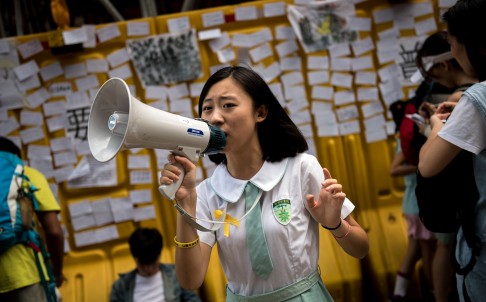
A girl in a school uniform urges people to write notes of support and their hopes for pro-democracy protests in Hong Kong. Photo: AFP
Rights group Amnesty International urged mainland China to release at least 76 people, detained on the mainland for supporting Hong Kong’s pro-democracy protests, before the start of next week’s Asia-Pacific leaders summit in Beijing.
Students calling for full democracy for Hong Kong have blocked roads leading into three of the city’s most economically and politically important districts for weeks, drawing condemnation from Beijing and the Hong Kong government.
Leaders including US President Barack Obama, Japanese Prime Minister Shinzo Abe and Chinese President Xi Jinping will gather for the November 10-11 Asia-Pacific Economic Cooperation (Apec) summit in the Chinese capital.
Preliminary meetings are already under way.
“Apec leaders must end their recent silence on the crackdown against mainland Chinese activists expressing support for Hong Kong pro-democracy protesters. Political convenience should not trump principled action,” said Roseann Rife, East Asia research director at Amnesty.
“The leaders should take this opportunity to speak out and urge President Xi to ensure all those detained solely for exercising their right to freedom of expression and peaceful assembly are immediately and unconditionally released,” she said in a statement.
Amnesty published a list of 93 mainlanders detained for “picking quarrels and provoking troubles” after attending events expressing support for the pro-democracy protests, creating related artworks and other activities. Seventeen of them have been released.
China’s foreign ministry, in a statement faxed to Reuters, said Amnesty was a group “prejudiced” towards China which often made irresponsible statements and interfered in the country’s internal affairs.
“We are resolutely opposed to this,” it added.
Beijing has ruled Hong Kong since 1997 through a “one country, two systems” formula that allows wide-ranging autonomy and freedoms not enjoyed on the mainland.
The Occupy Central protesters are demanding fully democratic elections for the city’s next chief executive in 2017, not the vote between pre-screened candidates that Beijing has said it would allow.
Amnesty said the detentions in China have been especially concentrated in Beijing, as well as the southern cities of Guangzhou and Shenzhen, which abut Hong Kong.
People have been held for putting pictures online with messages of support, planning to go to Hong Kong to take part in the protests or shaving their heads in solidarity, it said.
The government has stepped up security in Beijing ahead of the summit. Amnesty said some activists had been forced to leave the city, including prominent dissident Hu Shigen.
Xi has presided over a sweeping crackdown on the rights community since taking office two years ago and, while he has promised to improve the rule of law, the Communist Party will remain firmly in charge of the judicial system.
“The latest wave of detentions is part of a concerted attack on fundamental freedoms since President Xi took office. It makes a mockery of Xi’s recent claims that the rule of law and human rights will be fully respected in China by 2020,” Rife said.
Re: 'i'll just make lesser then': Chow yun-fat responds to prc ban for supporting hk
Xi Jinping pledges support for Hong Kong's efforts to safeguard rule of law
At their first meeting since start of the Occupy protests, president tells C.Y. Leung democratic reform must be done within terms of Basic Law
PUBLISHED : Sunday, 09 November, 2014, 2:08pm
UPDATED : Monday, 10 November, 2014, 6:10pm
Peter So, Kwong Man-ki in Beijing and Jeffie Lam
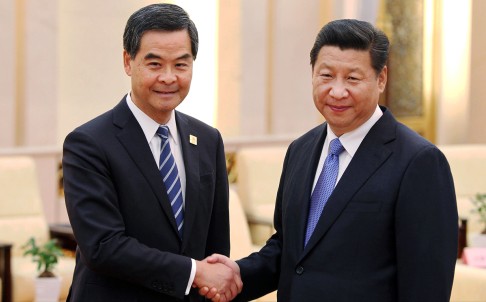
C.Y. Leung is greeted by Xi Jinping in Beijing. Photo: Simon Song
The central government will "resolutely support" the Hong Kong government's efforts to safeguard the city's rule of law which is the cornerstone of its future, President Xi Jinping told visiting Chief Executive Leung Chun-ying at their first meeting since the Occupy protests began.
Xi said China was committed to the city's democratic reform but stressed it must be done within the framework of the Basic Law - the city's mini-constitution.
He reiterated the need for Hong Kong people "to fully and accurately" understand the "one country, two systems" principle.
"The rule of law is a key foundation for Hong Kong's long-term stability and prosperity … The central government will stay committed to the 'one country, two systems' principle and the Basic Law. We will firmly support Hong Kong to develop democracy in line with law and its endeavour to maintain its long-term stability," Xi said.
Xi called on "all sectors in Hong Kong, under the leadership of Leung and the SAR government", to "seize the historic opportunity to realise universal suffrage according to [the Basic] Law", Xinhua reported.
Leung also said the central government would "soon" announce a through-train scheme to allow cross-trading of stocks in Hong Kong and Shanghai.
"Rule of law" is Xi's latest catchphrase and the central theme of the latest policy blueprint endorsed by the Communist Party. Xi reportedly told Leung that the blueprint mentioned the importance of safeguarding "one country, two systems".
A source close to the Hong Kong government said Xi cited a line from an ancient poem - "strong winds reveal the strength of sturdy grass" - as praise for Leung's loyalty and resilience in handling the Occupy protests and Beijing's firmest support yet for the chief executive.
The poem, said to be written by Emperor Taizong during the Tang dynasty, was often cited by emperors to praise loyal ministers in times of adversity. The line is followed by "turmoils test the loyalty of a good minister".
Leung said he told Xi that the Occupy protests had seriously disrupted the city's social order and shaken its rule of law, but that the Hong Kong government could handle the protests by itself and in accordance with the law.
Xi offered full support for Leung's efforts to maintain "social order".
The chief executive later said that Xi had expressed approval of his administration's recent performance, although Xi did not make such a reference in the opening remarks of the meeting, which was open to media.
Leung did not give an exact date for the through train but said the president "responded positively" to his request to start the scheme as early as possible.
The scheme would allow investors to conduct cross-border share trading up to a quota of 550 billion yuan (HK$700 billion). Leung said rule of law and social order were important conditions for implementing the scheme.
China watcher Johnny Lau Yui-siu said Beijing's attempt to link implementation of the through-train scheme with the city's social order would exert more pressure on Occupy protesters and strengthen public opposition to the movement.
Lau also believed Xi had implied that the political reform framework set by the National People's Congress could not be changed.
"The decision made by the Standing Committee of the National People's Congress is also law. Beijing's stance is clear - the blueprint is inalterable," he said.
The Federation of Students disagreed with Leung's claims and said it was his administration that was undermining the rule of law and social order.
Secretary general Alex Chow Yong-kang said: "Hongkongers understand these are little tricks by … Leung Chun-ying. He is not focusing on the most immediate issues and is instead diverting attention to other topics."
Xi Jinping pledges support for Hong Kong's efforts to safeguard rule of law
At their first meeting since start of the Occupy protests, president tells C.Y. Leung democratic reform must be done within terms of Basic Law
PUBLISHED : Sunday, 09 November, 2014, 2:08pm
UPDATED : Monday, 10 November, 2014, 6:10pm
Peter So, Kwong Man-ki in Beijing and Jeffie Lam

C.Y. Leung is greeted by Xi Jinping in Beijing. Photo: Simon Song
The central government will "resolutely support" the Hong Kong government's efforts to safeguard the city's rule of law which is the cornerstone of its future, President Xi Jinping told visiting Chief Executive Leung Chun-ying at their first meeting since the Occupy protests began.
Xi said China was committed to the city's democratic reform but stressed it must be done within the framework of the Basic Law - the city's mini-constitution.
He reiterated the need for Hong Kong people "to fully and accurately" understand the "one country, two systems" principle.
"The rule of law is a key foundation for Hong Kong's long-term stability and prosperity … The central government will stay committed to the 'one country, two systems' principle and the Basic Law. We will firmly support Hong Kong to develop democracy in line with law and its endeavour to maintain its long-term stability," Xi said.
Xi called on "all sectors in Hong Kong, under the leadership of Leung and the SAR government", to "seize the historic opportunity to realise universal suffrage according to [the Basic] Law", Xinhua reported.
Leung also said the central government would "soon" announce a through-train scheme to allow cross-trading of stocks in Hong Kong and Shanghai.
"Rule of law" is Xi's latest catchphrase and the central theme of the latest policy blueprint endorsed by the Communist Party. Xi reportedly told Leung that the blueprint mentioned the importance of safeguarding "one country, two systems".
A source close to the Hong Kong government said Xi cited a line from an ancient poem - "strong winds reveal the strength of sturdy grass" - as praise for Leung's loyalty and resilience in handling the Occupy protests and Beijing's firmest support yet for the chief executive.
The poem, said to be written by Emperor Taizong during the Tang dynasty, was often cited by emperors to praise loyal ministers in times of adversity. The line is followed by "turmoils test the loyalty of a good minister".
Leung said he told Xi that the Occupy protests had seriously disrupted the city's social order and shaken its rule of law, but that the Hong Kong government could handle the protests by itself and in accordance with the law.
Xi offered full support for Leung's efforts to maintain "social order".
The chief executive later said that Xi had expressed approval of his administration's recent performance, although Xi did not make such a reference in the opening remarks of the meeting, which was open to media.
Leung did not give an exact date for the through train but said the president "responded positively" to his request to start the scheme as early as possible.
The scheme would allow investors to conduct cross-border share trading up to a quota of 550 billion yuan (HK$700 billion). Leung said rule of law and social order were important conditions for implementing the scheme.
China watcher Johnny Lau Yui-siu said Beijing's attempt to link implementation of the through-train scheme with the city's social order would exert more pressure on Occupy protesters and strengthen public opposition to the movement.
Lau also believed Xi had implied that the political reform framework set by the National People's Congress could not be changed.
"The decision made by the Standing Committee of the National People's Congress is also law. Beijing's stance is clear - the blueprint is inalterable," he said.
The Federation of Students disagreed with Leung's claims and said it was his administration that was undermining the rule of law and social order.
Secretary general Alex Chow Yong-kang said: "Hongkongers understand these are little tricks by … Leung Chun-ying. He is not focusing on the most immediate issues and is instead diverting attention to other topics."
Similar threads
- Replies
- 0
- Views
- 154
- Replies
- 17
- Views
- 2K
- Replies
- 1
- Views
- 170
- Replies
- 4
- Views
- 473
